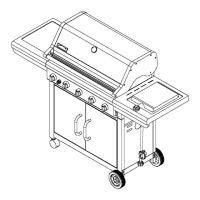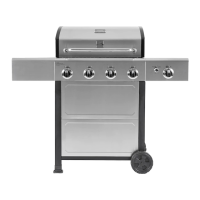Do you have a question about the Kenmore 139.20153510 and is the answer not in the manual?
Essential precautions for safe and compliant installation of the grill, covering codes and electrical grounding.
Details the one-year warranty against defects and ten-year warranty for stainless steel burners.
Information on purchasing extended repair coverage, including benefits and cancellation policy.
Specifies approved LP cylinder dimensions, construction, and valve types for safe operation.
Outlines safe practices for refilling LP cylinders, including 80% fill limit and dealer requirements.
Instructions for exchanging, storing, and leak testing LP tanks and connections before use.
Step-by-step guide for securely connecting the gas regulator to the LP tank valve.
Detailed steps for performing leak tests on valves, hoses, and regulators using a soap solution.
Key safety guidelines for operating the grill, including clearance, ventilation, and handling hot components.
Instructions for safely lighting the grill burners using either the ignitor or match lighting method.
Guidance on checking burner flames, turning off the grill, and inspecting valves and hoses.
Recommendations for cleaning the grill's exterior, interior, and plastic parts for optimal performance.
Instructions for cleaning burner tubes to prevent flashbacks caused by spider webs or debris.
Steps for safely removing and replacing the grill's drawers for cleaning.
Guidelines for storing the grill, including covering and LP cylinder disconnection for indoor storage.
Explains indirect cooking and provides essential food safety guidelines and safe internal temperatures.
Covers LP gas requirements, excess flow control, low heat conditions, and general maintenance tips.
Steps for connecting and disconnecting the natural gas conversion kit components.
Recommendations for preparing the gas supply line and installing the conversion socket.
Chart detailing recommended tubing sizes for natural gas lines based on distance from the house.
Comprehensive list of grill parts with corresponding numbers, quantities, descriptions, and artwork.
Lists the included hardware and tools required for assembly, with quantities and specifications.
Continues the detailed parts list, providing part numbers for various grill assemblies and components.
Lists remaining parts, including battery, side shelf brackets, and other miscellaneous components and kits.
Visual representation of the grill with numbered parts corresponding to the parts list.
Instructions for inserting the side burner drip tray into its designated position.
Steps for installing the side shelf brackets using screws.
Instructions for attaching the side shelves to the brackets using nuts, washers, and screws.
Guidance on attaching control knobs, heat diffusers, cooking grids, and the warming rack.
Steps for inserting the side burner cooking grid into its correct location.
Instructions for opening the battery compartment and inserting the AA battery for the ignitor.
Steps for inserting the drip cup into its bracket within the grill.
Instructions for securing the LP gas tank and connecting the regulator to the tank valve.
Addresses issues with the grill or side burner failing to ignite, listing possible causes and solutions.
Explains causes of yellow flames or gas odor and provides corrective actions.
Offers solutions for excessive flare-ups, including adjusting heat settings and hood use.
Details causes for burners blowing out and corrective actions, such as checking gas supply.
Addresses low heat issues when the knob is set to high, for both natural gas and LP models.
Explains how gas line size and length affect natural gas pressure and low heat.
Discusses low heat in LP gas models due to the excess flow device and corrective steps.
Covers reasons for sudden gas flow drops or low flames, including out of gas or tripped excess flow valve.
Troubleshoots issues with the cooking light not turning on, checking power supply and bulb.
Critical safety advice regarding electrical connections, grounding, and avoiding extension cords.
Covers ventilation, temperature range, heat sources, cord care, breaker size, leveling, and child safety.
Steps for initial cleaning and plugging the refrigerator into a proper GFI outlet.
Explains how to adjust the refrigerator's temperature control for optimal cooling.
Warning regarding restarting the unit after power interruption or unplugging.
Tips for efficient and safe food storage within the refrigerator to maintain freshness and save energy.
Detailed instructions for cleaning the interior and exterior of the refrigerator.
Advice on how to protect food during power outages and minimize temperature fluctuations.
Guidelines for leaving the refrigerator operating during short vacations or preparing it for long-term storage.
Recommendations for optimizing refrigerator efficiency and reducing energy consumption.
Addresses issues where the refrigerator unit fails to start, checking power and temperature settings.
Explains causes for frequent cycling, including ambient temperature and door usage.
Discusses causes of unit vibrations and ensures proper leveling for quiet operation.
Identifies common noises like clicking, scraping, and squealing and their probable causes.
Provides solutions for doors that do not close properly, checking leveling, gaskets, and obstructions.
Lists key technical data for the appliance, including voltage, power, and refrigerant type.
Visual schematic showing the electrical connections and components of the appliance.












